The benefits and harms of soy for women of different ages
By studying the traditional diet of the inhabitants of Asia, scientists have found that soy products make up a large proportion of their diet. Superimposing this data on the World Health Organization's research on the spread of cancer in the world, they suggested that women in Asia are less likely to get breast cancer precisely because soy is the basis of their diet. In addition, it is widely believed that phytoestrogens suppress hot flashes in the climacteric period. Is this really so, what are the benefits and harms of soy for women - read on.
The content of the article
Soybean composition
Soy rich in vitamins, micro and macro elements. So, for example, the vitamin content in 100 g of raw beans is:
- beta-carotene - 0.15 mg;
- B1 (thiamine) - 1 mg;
- B2 (riboflavin) 0.2 mg;
- B3 (nicotinic acid) - 2.2 mg;
- B4 (Choline) 270 mg;
- B5 (pantothenic acid) - 1.7 mg;
- B6 (adermine) - 0.8 mg;
- B7 (biotin) - 0.007;
- B9 (folic acid) 0.2 mg
- C (ascorbic acid) - 6 mg;
- E (tocopherol) 17 mg
Only 100 g of soybeans contain a significant share of our daily requirement for micro- and macroelements, and in some indicators they significantly exceed it:
- potassium - 64%;
- calcium - 20%;
- magnesium - 55%;
- phosphorus - 60-75%;
- sulfur - 20%;
- sodium and chlorine - less than 4%;
- boron - 190%;
- cobalt - 300%;
- nickel - 850%;
- manganese - 150%;
- molybdenum - 140%;
- copper - 50%;
- zinc and iron - 30% each;
- iodine - 5%.
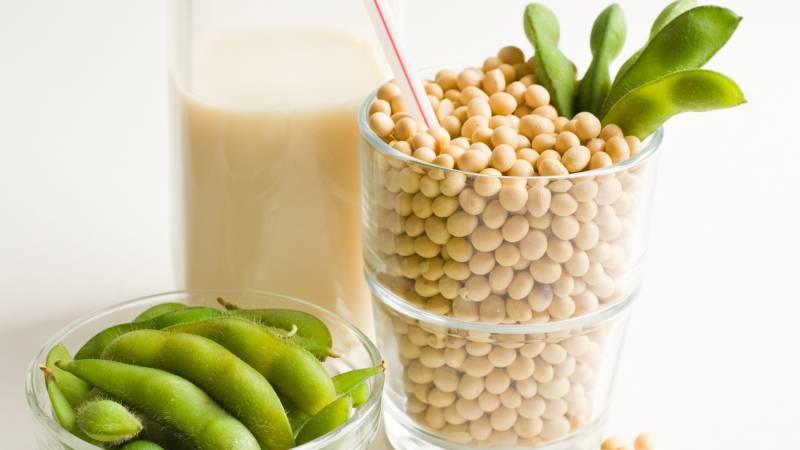
Soya beans - a good alternative to meat and dairy products, since the protein content in seeds reaches 40%, and it is easily absorbed by the body. Fat content - 30-40%:
- unsaturated, including linoleic and oleic acids - up to 34.4%.
- saturated - up to 5.6%, which is significantly less than in meat.
Carbohydrates make up 20-30% and include polysaccharides and soluble sugars.
If you consume soy in beans, the body will receive an additional good portion of fiber.
Attention! Soybean fruit is a unique product containing isoflavones: daidzein, genistein, and glycitein. These phytoestrogens are not plant hormones, but have properties similar to estrogens (female sex hormones), only with less pronounced activity. Their properties and effects on the human body have not yet been fully understood, but the scales tilt in favor of the fact that they give our health more good than bad.
Why soy is good for women
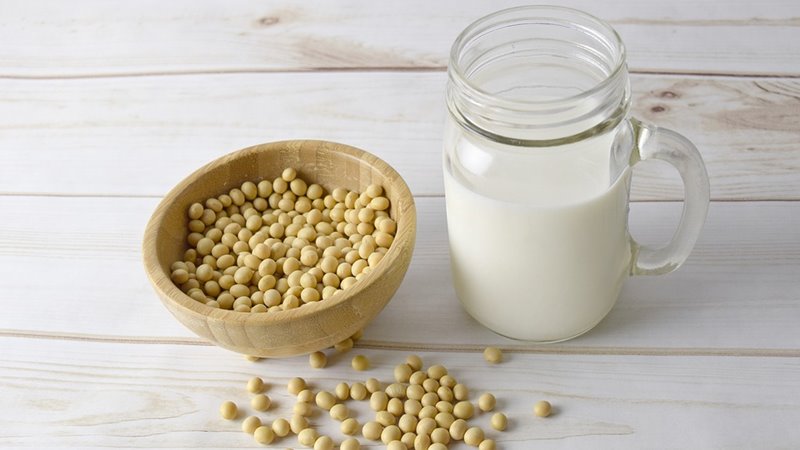
At the end of the 20th century, a number of studies were carried out aimed at identifying the relationship between the dietary habits and lifestyle of representatives of different cultures with the incidence of diseases of the cardiovascular system and oncological diseases. It turned out that the inhabitants of Southeast Asia suffer from breast cancer, heart and vascular diseases much less frequently than the representatives of America and Europe.... It was hypothesized that this situation is associated with the active consumption of soy products by the inhabitants of Asia.
Reference. The antioxidant qualities of genistein and daidzein contained in beans can neutralize free radicals, prevent or halt the development of malignant tumors, and reduce the risk of cell degeneration into cancerous ones.
After 50 years
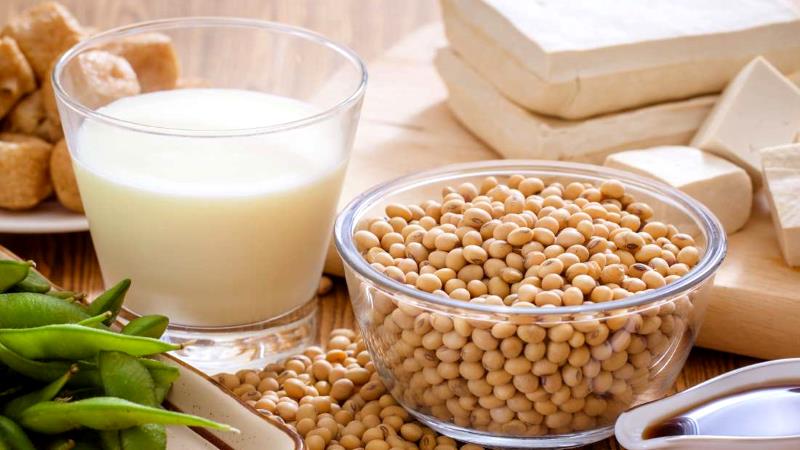
But if cancer affects people regardless of their age, then women in 50 years have quite typical problems that soy-based products help to cope with:
- Taking drugs based on phytoestrogen in the postmenopausal period in 45% of cases reduces the intensity and frequency of hot flashes and sweating. Even if some of the respondents had a placebo effect, the rest were helped by the effect of isoflavones.
- The inclusion of soy in the diet or supplementation with these beans significantly slows the progression of osteoporosis. This is due to the partial compensation of one's own estrogens by phytoestrogens, due to the content of a large percentage of calcium, which is so necessary for bones, and the action of phytic acid, which slows down the development of cells that destroy bone tissue.
- Regular consumption of soy products reduces the likelihood of cardiovascular diseases: stroke, hypertension, cerebrovascular accident, etc.
- Soy useful for restoring metabolism, improving diabetes, for the treatment of disorders of the gastrointestinal tract.
- An important role is played by the content of lecithin in soy products, which normalizes cholesterol levels, stimulates the outflow of bile, speeds up metabolism, thereby helping to cope with the problems of excess weight.
Harm and contraindications of soy for women
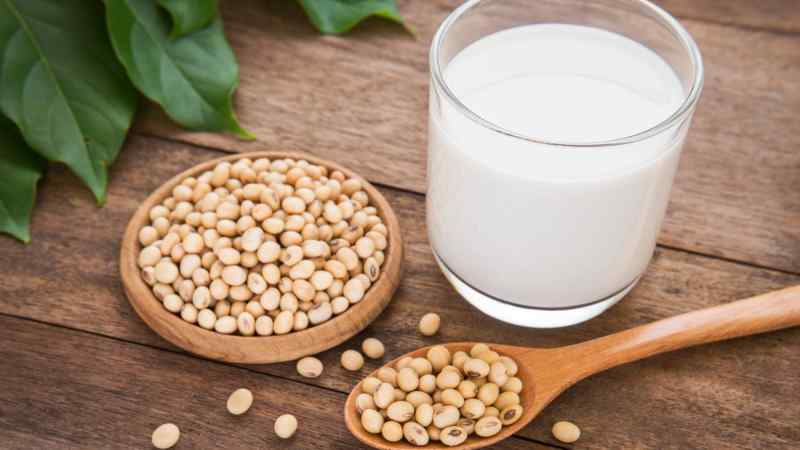
For some time now, doubts began to arise whether soy is so useful for women's health when it comes to its unique component - isoflavone. Doubts are based on the fact that cancer can be triggered by the female sex hormone estrogen. Since isoflavone mimics its behavior, in theory, it can cause the formation of atypical malignant cells.
However, this theory has not been confirmed by anything. Moreover, the experience of Japan, Indonesia, China and other Asian countries shows the opposite, since the incidence of breast cancer in Asian women is 30% lower than, for example, in American women.
Important! The risk of thyroid disease exists when a large amount of strumogenic substances (for example, soy flour) are absorbed, which block the absorption of iodine, and at the same time there are no iodine-containing foods in the diet.
During pregnancy
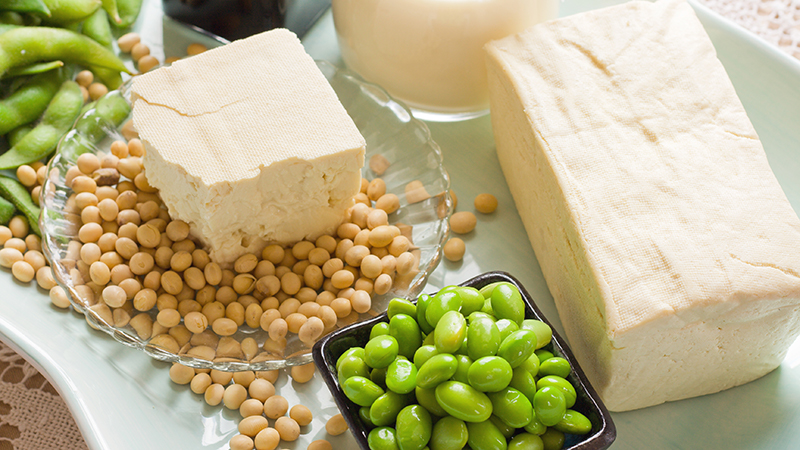
During the period of bearing a child, a woman's body works differently, and it happens that food that is useful in all respects can cause bad consequences during pregnancy in an expectant mother or fetus:
- Soy contains phytic acid, capable of affecting the absorption or blocking of minerals. During pregnancy, there is a risk that access will be blocked not only for harmful substances (for example, heavy metals), but also for micro and macro elements necessary for the development of a child in the womb.
- The benefits of soybeans are that they lower cholesterol levels. But pregnancy is the case when dignity turns into a disadvantage, since the female body during this period requires cholesterol to produce estrogen and progesterone - hormones responsible for the safe bearing of a child.
- Soy is an allergen, and in order not to provoke allergies in the unborn baby, it is better to limit the consumption of soy products.
The general recommendation for soy consumption during pregnancy is to reduce portions and frequency of intake, and to prefer fermented soy, in which the action of phytic acid is neutralized.
Conclusion
The properties of soybeans are still to be studied - while research results are often conflicting. Based on common sense, you should take the best from soy, use it in food, and at the same time do not give up other foods so that the body receives a balanced and nutritious diet.